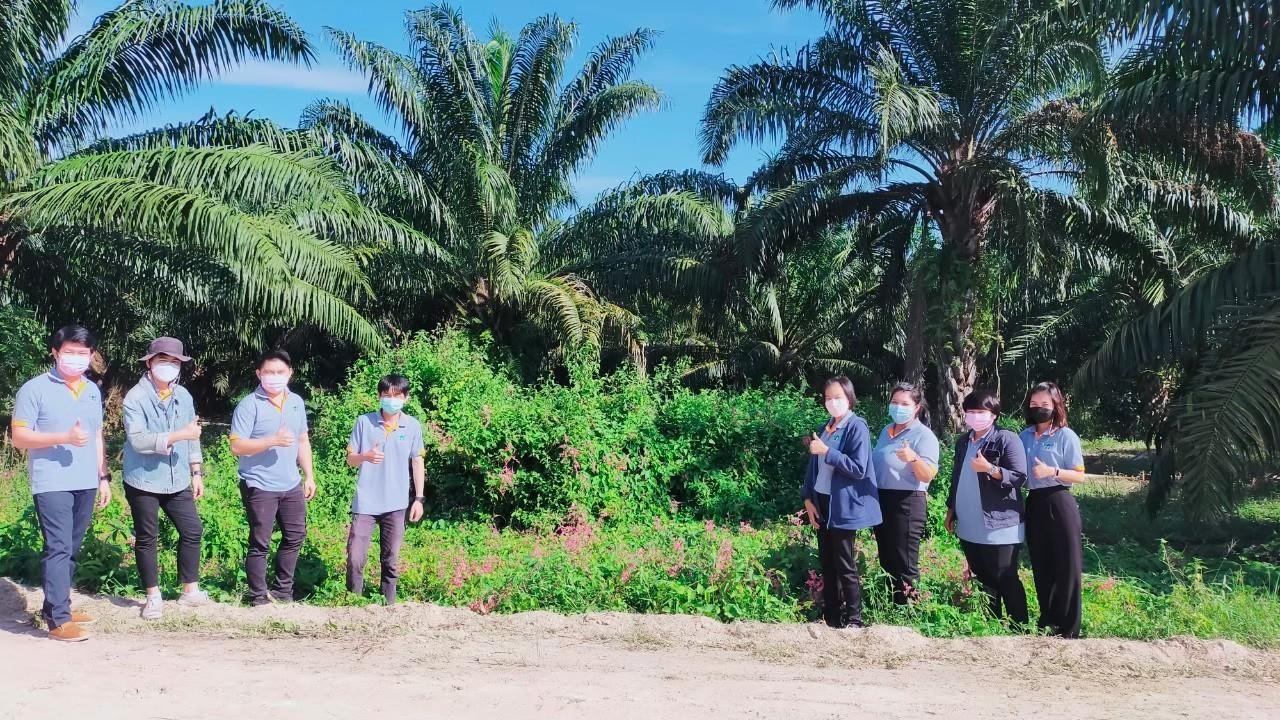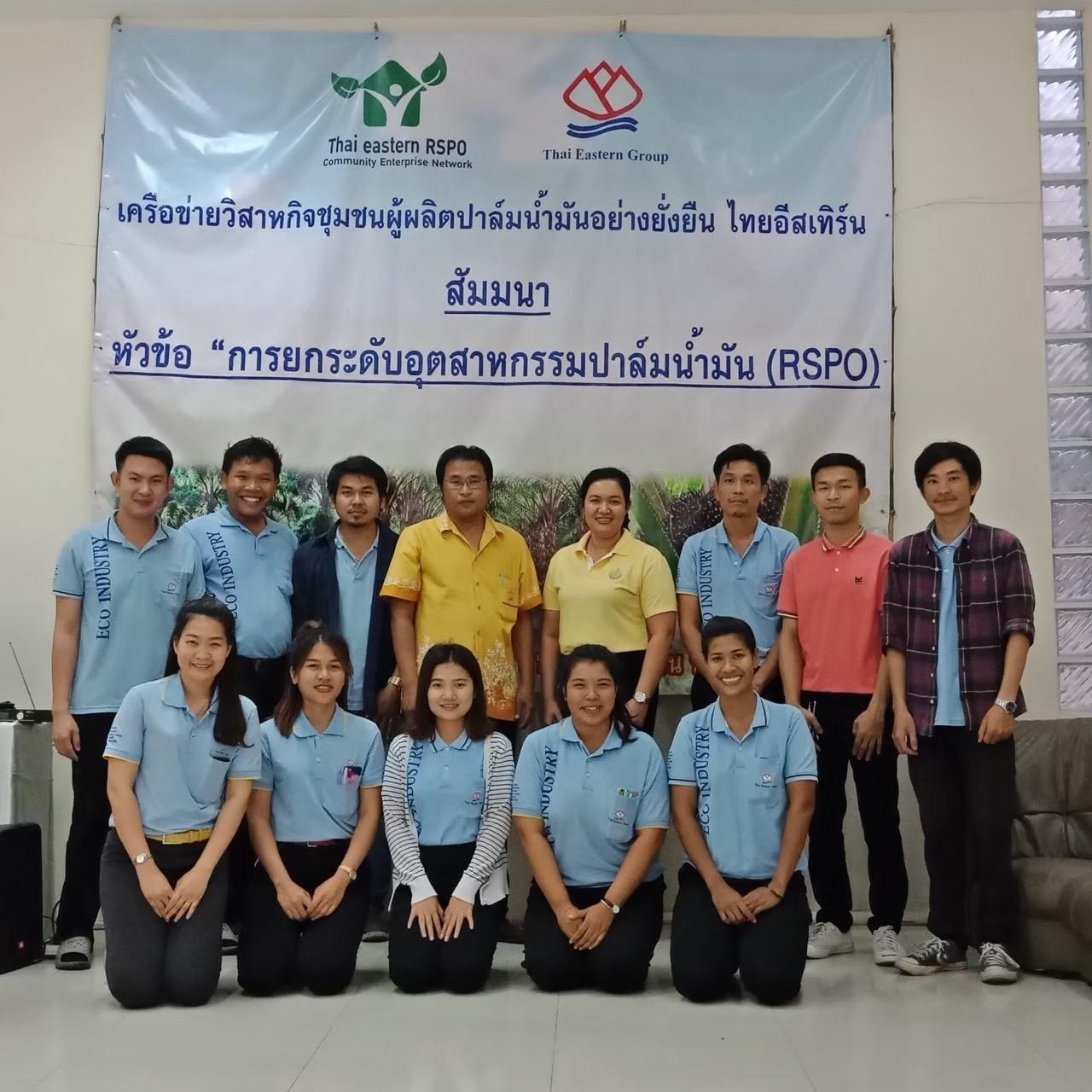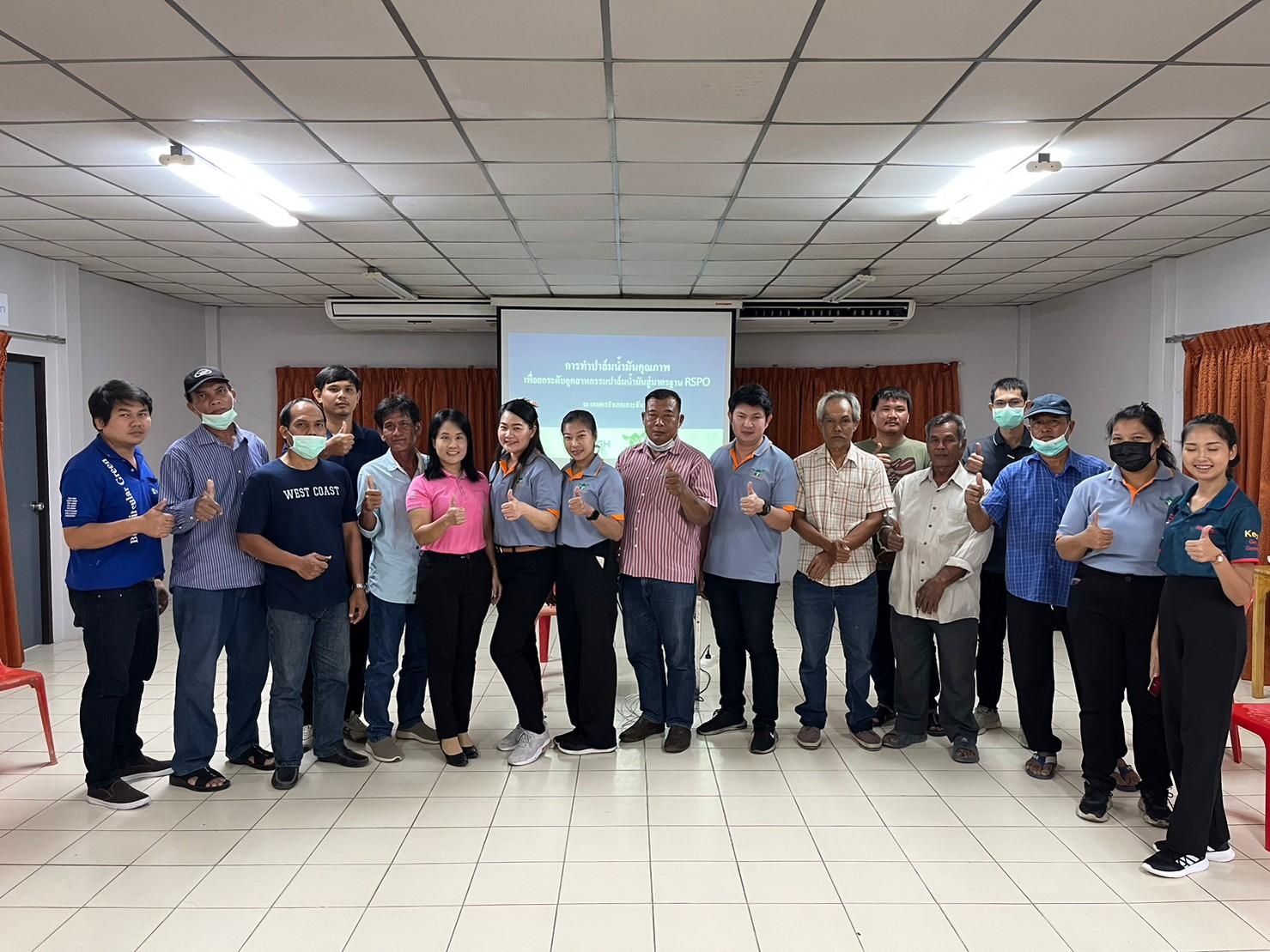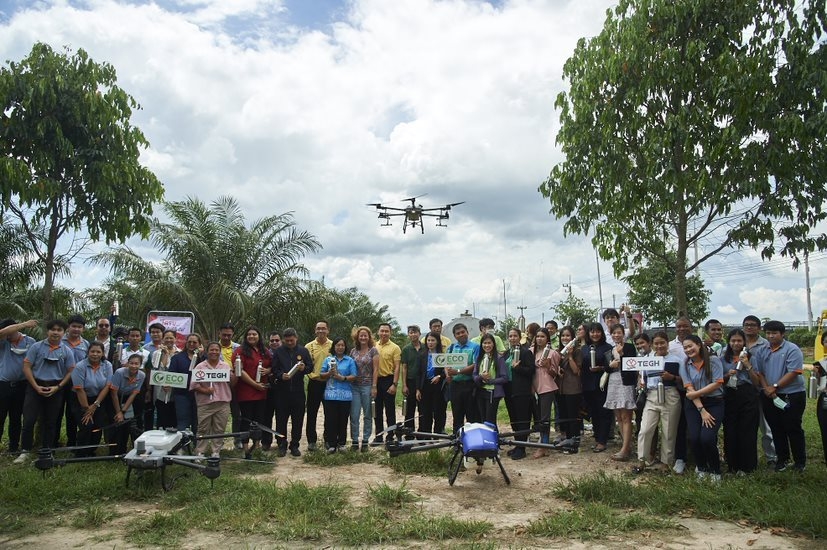
About the group
Number of smallholders: 340 (221 Men, 119 Women)
Total Land Area: 2654 Ha
Status: Certified
Group location: 135 Moo. 2 Khao Sok sub-district, Nong Yai district, Chonburi province 20190
Country: Thailand
On-going Facilitator: Thai Eastern Group Holdings Public Company Limited.
SUSTAINABILITY JOURNEY STORY
“Previously, farmers and villagers found high levels of toxic chemicals in their bodies during blood tests. Even farmers who did not spray pesticides on their own farms had high amounts of chemical substances in their bodies. However, they now find fewer chemicals because farmers are more aware of health and safety concerns.”
Mr. Satawat Sriruen, System Administrator for sustainability, Thai Eastern RSPO Community Enterprise Network
……
“We decided to form a group and become certified members for sustainable palm oil production to improve farm management practices. Better quality allows us to sell the products at higher prices than the market, and to export to overseas markets in the future,” Satawat Sriruen, System Administrator for Sustainability, Thai Eastern RSPO Community Enterprise Network shared.
“Being a certified group can save farm management costs. For example, aggregating purchasing volume of fertiliser as a group results in lower pricing than the typical market rate. Furthermore, growers become more knowledgeable about fertilisation by following recommended fertiliser application schedules.
“Growers can better manage their plantations and anticipate the volume and kind of fertiliser needed each year, which is another benefit of the sustainable palm plantation effort. Furthermore, they record income expense data and compare outcomes to previous years when they took few notes on fertiliser application. Perhaps because some growers live hand to mouth, they do not attach much importance to record-keeping. However, once they begin taking thorough notes on their farm activities, they become more aware of income expense evaluations for things such as fertiliser and palm-cutting costs. The ability to analyse cost-effectiveness shows where they may need to increase one cost or reduce another.
“There are also positive effects on the ecosystem. Growers, for example, have planted sage rose trees to attract beetles instead of using pesticides. The group distributes young sage rose trees to farmers to attract insects. This can partially resolve the problem, but some chemical applications may still be required to completely eliminate some types of insects, beetles in particular.”
The System Administrator stated, “If the group is certified by RSPO, there will be no social and economic impacts on nearby communities because the local farmers comply with the standards very well. On the contrary, it has a positive impact on the communities. Once the group is formed, farmers have more discussions and exchange information regarding issues such as plant diseases and state-of-the-art cutting equipment. Farmers tend to exchange ideas and confer with others who have firsthand experiences. This partnership is yet another way to improve farm management.”
Satawat further stated, “The group has followed environmental initiatives through the Reforestation Project on World Environment Day. Thai Eastern Palm Oil Company has requested young plants such as Hopea odorata, Siamese Rosewood (Dalbergia cochinchinensis) and Yang naa (Dipterocarpus alatus) from the Bang Pra Agricultural Extension office to distribute to farmers. They then plant these trees in the vicinity of community forests and factories, and monitor them to make sure that villagers and factory Workers maintain these trees in good health.
“There are other projects that promote sustainable environmental practices by adding value to farms. Expert horticulturalists, for example, provide trainings on mushroom cultivation alongside palm rhizomes. Farmers are then able to grow mushrooms for their own consumption. This has not yet been scaled up to the point where the mushrooms can be sold.
“Eastern Palm Oil Company Limited provides support by purchasing ash as well as palm residues that have gone through a biogas process,” Satawat said when asked about the partner of the group. “They also assist in ordering fertilisers from less expensive but high-quality sources. The factory has a laboratory for analysing nutrients in fertilisers.”
When questioned if the group had used RSPO tools such as the High Conservation Value (HCV) application, the response was, “Not yet. If there are trainings, members are eager to learn about its application. However, for the time being, they survey the area on their own.”
Satawat identified farmers’ attitudes as the key challenge of transitioning to sustainable plantation practices. “Most farmers are not accustomed to taking notes or gathering data. They consider it cumbersome. Senior farmers especially may remember to apply fertilisers on their farms, but forget to record fertiliser applications in the document. Only a small group of the younger generation take notes and collect data, so we had some issues in the beginning.
“To address such issues, the group reached out to farmers to talk, educate and advise, as well as distribute notebooks. Farmers didn’t take many notes before, as they believed that there were so many steps. We need to put more effort into demonstrating the advantages of taking notes. For instance, if farmers keep track of how much they spend, they can determine if those products are worthwhile in terms of the investment. At present, most members keep farm records, and only a few times do we have to follow up because now less people forget to take notes.”
When asked about the next year or five-year plan for sustainable oil palm production, Satawat replied, “The goal is to increase membership since more than a hundred people have expressed interest in joining the group. They say that they have already learned about RSPO and envision that if their farms are certified and meet the standards, they will be able to sell the yield at higher rates and obtain more productivity per rai.
“The greatest change after shifting to sustainable oil palm plantation farming is improved living conditions. Previously, farmers and villagers found high levels of toxic chemicals in their bodies during blood tests. Even farmers who did not spray pesticides on their own farms had high amounts of chemical substances in their blood. However, they now find fewer chemicals because farmers are more aware of health and safety concerns. Before, they had no idea how dangerous the chemicals they used were,” Satawat explained.
In describing the key factors that will enable smallholders to be certified long-term, Satawat drew from personal experience, highlighting the need for “good support from extraction mills to buy RSPO Certified raw palm at higher prices than non-certified palm fruits and consistently complying with the requirements of the standards. Even though ‘maintaining status’ is difficult, farmers are willing to adapt.
“The group sets up Line chat applications to communicate, share knowledge and exchange such information as palm diseases that occur in the rainy season, or trends in palm prices,” Satawat said when questioned about specific means of collaborating with smallholders. “Meetings are held four to five times a year and received good collaboration from smallholders in each meeting. There were no in-person meetings during the Covid-19 pandemic, but the speakers created e-learning links sent to the Line group on a regular basis.”
The main drivers to maintaining sustainable palm plantation practices involve having strong groups that provide reliable support for the members. “If there are problems at any farm, growers will share that information. Growers occasionally report disease and pest issues. Other members help out around the farm. Farmers who have expertise about the disease will provide advice. These are some examples of the methodologies that support all members’ farms to meet the same standards and grow together,” Satawat explained.
Asked if the group has planted mixed crops to diversify income, Satawat responded, “Most farmers grow pineapples from the time they first planted palm until five to six years. Some plant other crops to earn extra income while waiting for the palm trees to mature. Some grow cocoa since it is a popular economic crop. If it is a moist area, farmers grow vegetable fern plots. When palm trees grow, these shade-loving plants can thrive in partial sun beneath adult palm trees.
“Complying with the RSPO Standards and sustainability are major problems. Although obtaining certification is difficult at first, it is harder to maintain accreditation. Therefore, it is critical to find ways to motivate farmers to keep their certification.
“Most farmers are elderly while some of the younger generation are not interested in managing farms. There is an issue with attracting young people to farm and convincing them that palm plantation work is not as difficult or tiresome as in the old days,” concluded Satawat.
Project Impact
Total area covered by the project
2654 Ha
Number of smallholders benefitting from this project
340 Smallholders
Number/percentage of women supported by this project
35.00% women in this project
How you can support
- Annual budget for RSPO certification continuation.
- Budget to support sustainable activities of the Thai Eastern RSPO Community Enterprise Network, such as training farmers, providing knowledge about RSPO standards, and covering travel expenses to participate in group activities.
- Budget for trainers of various training programs.
GROUP CONTACT
Representative Contact
Oraphan Paripol | Group Manager | [email protected] |
Chamrat Kamkaew
Finance and Accounting Department
(+66) 81 377 6593
[email protected]
IMAGE GALLERY

Thai Eastern RSPO Community Enterprise Network

Thai Eastern RSPO Community Enterprise Network

Thai Eastern RSPO Community Enterprise Network

Thai Eastern RSPO Community Enterprise Network




